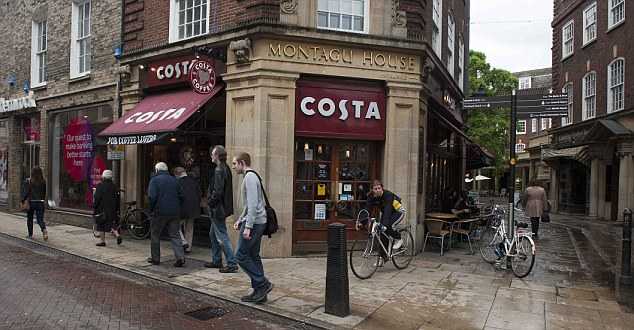LONDON, UK – New research from global information company The NPD Group reveals intense competition for the coffee business in the British foodservice industry.
It seems like there’s a coffee chain wherever you turn, and indeed Britain’s high street specialist coffee chains have increased their individual coffee servings by 21% since the year ending (YE) June 2008.
However, in the same period, other foodservice operators such as quick-service restaurant (QSR) outlets – which are better known for serving burgers, chicken sandwiches or bakery products – have increased their sales of coffee three times faster, at 63%.
Pubs have also realised the importance of coffee and have increased servings by 18% since 2008.
Coffee shops grab a bite out of lunch
The appeal of coffee has allowed operators to use it as a way of entering new eating opportunities or ‘dayparts’.
As QSR operators have started to invest in coffee for breakfast and snacking, coffee shops have responded by trying to take a bite of their lunch business, which generates over 50% more spend than that produced by customers who just want snacks.
Although coffee shops now generate 27% of their traffic at lunchtime, they have only been able to achieve a marginal increase in their share of food servings to date as a result.
And with other foodservice operators undercutting the coffee specialists by as much as £1.30 on a regular Americano, they must sell other items to maintain their profit margins.
659 million visits to coffee shops a year
Coffee shops are working hard to boost visits too. By the YE June 2017, Britain’s well-known coffee outlets had increased visits by 120 million since 2008 to 659 million visits a year, a 22% increase.
They have increased visits faster than the wider quick-service restaurants (QSR) sector, which increased visits by 10% between 2008 and 2017.
So far, despite the growing competition, coffee shops have maintained market share to provide some 41% of coffee servings in Britain’s QSR sector, a similar level to recent years.
Britain’s high street coffee outlets now account for 6% of the visits of the entire British foodservice industry.
Cyril Lavenant, Foodservice Director UK at the NPD Group, said: “Britain’s coffee market is highly competitive, with specialist outlets not just competing against each other but also taking on the high street QSR brands. Quality coffee is now available in a huge variety of locations – fast-food restaurants, sandwich shops, bakeries, supermarkets and convenience stores, high street retailers, tourist attractions, and of course petrol stations. It’s no exaggeration to say that offering high-quality coffee is the lifeblood of the British foodservice market. It provides a route for foodservice operators to serve customers from their menu throughout the day, from coffee with breakfast to coffee after a dinner out.”
The top 10 operators serve one third of all coffee bought out of home
The importance of coffee to Britain’s leading foodservice operators is evident in the growing concentration of this business.
In 2008, the top 10 operators together accounted for 26% of all coffee servings in Britain.
By YE June 2017, this had increased to 35%, with leading players consisting of a mix of specialist coffee shops, QSR brands, supermarkets and a pub chain.
According to Lavenant the specialists must “wake up and smell the coffee” if they are to retain market share.
“Consumers can grab a coffee anywhere, so the message for the specialist coffee shops is that they must stand out to compete. Coffee shop chains tend to look alike and have a similar menu and ambience. If there were no branding outside or inside the shops, it would be difficult for consumers to know for sure which outlet they were in. Some of the new, independent coffee businesses are adopting a fresh approach with brighter, sharper interiors, a more inviting atmosphere and appetizing menu boards.
What’s fascinating about the coffee market is that we are seeing new independents performing just as well as the bigger, established coffee chains. Consumers want something innovative and even quirky to try, and they believe that local outlets will have a superior range of products. The established brands have become bland. They need to wake up and smell the coffee to take on competitive threats from both extremes of the foodservice sector.”









 CAPS: the new proprietary system using capsules made of 85% recycled aluminium
CAPS: the new proprietary system using capsules made of 85% recycled aluminium







